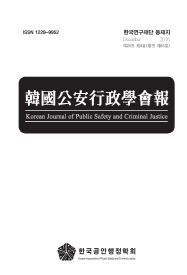경찰조직은 강한 위계적 구조와 권위주의적 문화가 특징으로, 이러한 환경에서 무례함의 확산은 개인 간 문제를 넘어 조직성과에도 중요한 영향을 미칠 수 있다. 이 연구는 조직문화 유형이 무례함의 전이 과정을 어떻게 조절하는지를 실증적으로 분석하기 위해 상사와 동료/부하의 무례함이 자기 무례함으로 전이되는 과정을 살펴보았다. 연구 결과, 위계문화는 무례함의 전이에 대해 상사로부터의 영향은 강화하고, 동료 및 부하로부터의 영향은 억제하는 상반된 조절 효과를 나타냈다. 또한 집단문화는 상사 무례함과 자기 무례함 간의 관계를 강화시키는 경향이 있었으며, 발전문화와 합리문화는 무례함의 전이를 억제하는 경향을 보였다. 이러한 결과는 경찰조직 내에서 건강한 조직문화의 중요성을 강조하며, 무례함을 예방하고 조직의 성과를 향상시키기 위한 전략적 접근이 필요함을 시사한다.
This study examines the spiral of incivility within police organizations, with a focus on how incivility spreads through interactions with superiors and peers/subordinates. Due to the hierarchical structure and authoritarian culture inherent in police organizations, the diffusion of incivility can extend beyond interpersonal conflicts, potentially affecting overall organizational performance. To empirically analyze how organizational culture moderates the process of incivility transmission, this research explores the pathways to enacted incivility—specifically, how incivility from superiors, peers, and subordinates is internalized and enacted by individuals. The findings reveal that hierarchical culture strengthens the transmission of incivility from superiors while simultaneously inhibiting the spread of incivility from peers and subordinates, indicating differential moderating effects. Additionally, group culture tends to amplify the relationship between superior incivility and enacted incivility, whereas both developmental and rational cultures serve to mitigate the transmission of incivility. These findings emphasize the critical importance of fostering a healthy organizational culture in police organizations and suggest the need for targeted interventions to prevent the spread of incivility, thereby improving both organizational performance and employee well-being.
Ⅰ. 서론
Ⅱ. 이론적 배경
Ⅲ. 연구의 설계
Ⅳ. 연구결과의 분석
Ⅴ. 요약 및 결론
참고문헌
(0)
(0)
